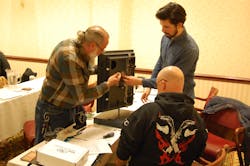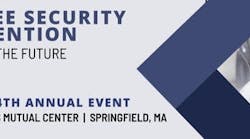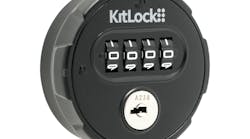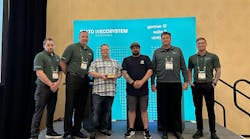If you’re a security pro, many opportunities are available for you to enhance your professional profile in the security industry. Not only can locksmiths enroll in hands-on work and certification programs from ALOA, but other security industry certification opportunities also are available if you want to expand beyond the door.
Few professionals in the security industry that understand the value of certification and continued learning more than Tom Demont, who has 13 security industry certifications at last count. Demont, the president of the International Association of Investigative Locksmiths, a division of ALOA, and a product manager and consultant for ASSA High Security Locks for more than three decades, is a staunch advocate of certification. However, he insists that certifications can be just as important as a security pro’s pedigree that earns their clients’ trust as it is a learning building block.
“Locksmiths that are going on for technical professional credentials are doing it for their customers,” he says. “When their customers see that they are certified by a national association as a certified professional locksmith, the end user knows that somebody has actually looked at this person and decided that they're competent and trustworthy. I think that is what our customer base is looking for.”
The growing number of active-shooter incidents and an increase in residential crime have opened a competitive market, even for locksmiths. Whether they’re institutional, commercial or homeowners, clients are taking that extra step to ensure they’re hiring qualified and reputable security pros.
“With all these scammers out there, potential clients don't know who to believe as far as who's a good locksmith or who's bad locksmith,” Demont adds. “Certifications can move you to a different level than your counterparts. If you have a certification, it highlights the fact that you have earned the expertise required to not only be a locksmith, but one that’s working in a specialized area. It’s your ‘Good Housekeeping Seal of Approval,’ proving you’re a locksmith, not just a business with a catchy name that does lockouts for $19.”
Array of Specialties
In today’s world, the role of a security pro requires more than technical prowess. It extends into risk assessments that can help commercial and residential clients to understand better the threats they face and begin to implement a plan to mitigate those risks. Similar to ALOA, security organizations, such as ASIS (The American Society of Industrial Security) and the Security Industry Association offer certifications for physical security and project-management proficiencies that locksmiths can use to branch out into more-sophisticated projects.
Certifications also can steer locksmiths into specialized fields, such as Demont has done with his status as a certified forensics locksmith that he has parlayed into a sideline as a security consultant and expert witness.
“When attorneys hire expert witnesses, you can’t have enough certifications for them,” he says. “They want to see that you’re an expert in everything that they want you to work on, so I carry multiple certifications, and the most important ones to me are my certified forensic locksmith certifications.”
The bread and butter for locksmiths remains the ALOA certification programs, which are many and varied. Many states include the same requirements as those for ALOA’s certifications in their licensing regulations.
For security pros, such as Joey Lachausse, professional certifications from ALOA provide the credibility of an acknowledged industry association that’s a storehouse of technical knowledge for locks, safes, access control and other physical security.
“I took my first PRP (Proficiency Registration Evaluation) exam in the mid-90s, failed my first try but succeeded and got my CRL (Certified Registered Locksmith) the next attempt,” explains Lachausse, who attained his Certified Professional Locksmith (CPL) soon after.
Over the years, he kept testing when he could. “I had the opportunity to work with Jim Hancock at ALOA as assistant education manager, as well as ALOA and SAVTA tech support from 2012 to 2015. In that time, I also got my Certified Automotive Locksmiths (CAL) and later my Certified Master Locksmith (CML), as well as my CAI instructors certification.”
Lachausse adds that he always has been a proponent of the PRP and says that through the years, his certifications have landed him government work and other high-profile jobs. Unfortunately, he believes that the time when the PRP could land jobs or contracts might be fading.
“I personally do not believe it’s as seriously respected any more — sad to say,” he says. “But I’m glad and proud of my certifications.”
Other Certifications
Although ALOA is the gold standard for the industry, there are other certifications locksmiths might want to consider. The online job site, Zippia.com, suggests taking your professional status beyond the CML and considering supplementary accreditations.
One that’s recommended is the OSHA Safety Certificate if you plan to handle clients in the industrial or commercial sectors. This 40-hour program covers the Construction 1926 and General Industry 1910 Standards, how to effectively interpret the Federal Register, health issues related to a work environment, recognition of physical hazards related to the violation of OSHA standards and employer implementation of its own proactive safety and health procedures.
Another suggested certification is the Master Certified Electronics Technician (CETma). A technician who has at least six years’ combined work and electronics training may be eligible for the ETA CETma designation. The CETma certification was created to highlight technicians who are able to demonstrate proficiency in the many fields of electronics. In addition to the Associate level certification, one must obtain six other certifications, with no more than two originating from the same specialized category, to qualify.
Since its development in the mid-1980s, the ALOA PRP Certification program has strived to help add a degree of professionalism to the locksmith industry. Although we all know a written exam doesn’t always reflect one’s abilities accurately, it’s a measure that the public can understand.
“Human nature makes one gravitate toward providers that have some form of credential in their chosen field,” says Hancock CML, CMST, ICML, CAL, CFL, CHI, CAI, who has been the education and certification manager for ALOA for more than a decade. “As a service provider hired to provide a more secure home, business and overall environment to the same public, it makes sense to be able to provide a credential of proficiency for their peace of mind. While the general public may not be aware of our credentials, once they see them attached to your name and business, there’s an elevation of status in their mind.”






